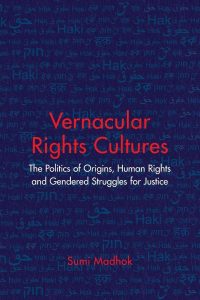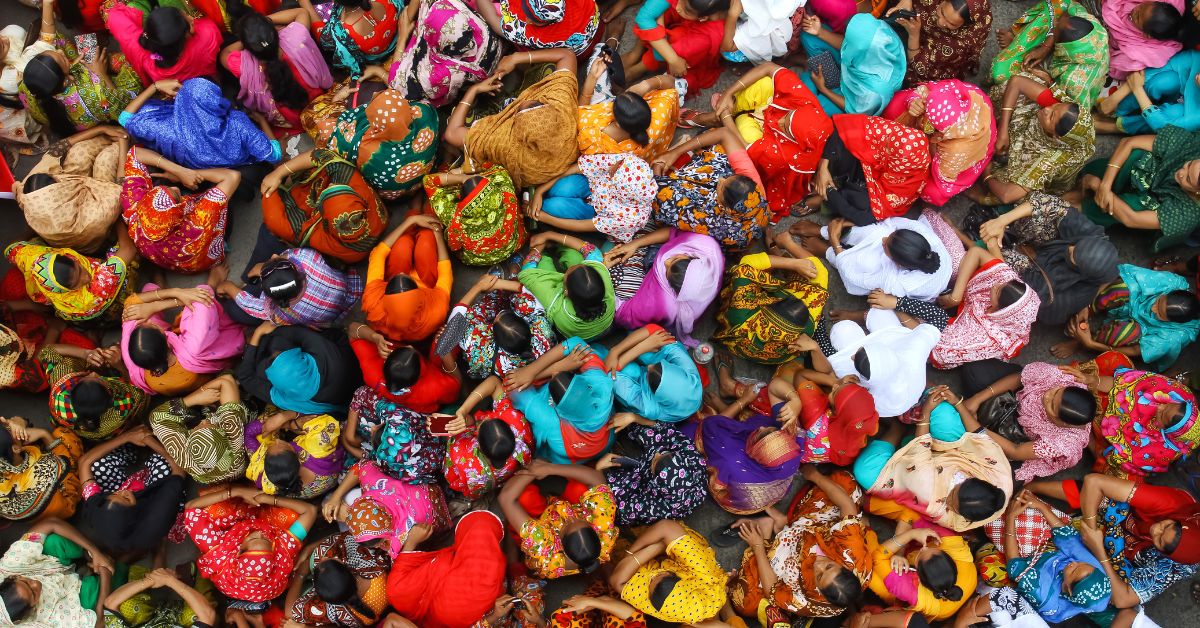In this interview with Anna D’Alton (LSE Review of Books), Sumi Madhok speaks about her latest book, Vernacular Rights Cultures which subverts prevailing frameworks around human rights by exploring how subaltern groups mobilise for justice through particular political imaginaries, conceptual vocabularies and gendered political struggles.
Read a review of the book for LSE Review of Books here.
 Q: In Vernacular Rights Cultures, you critique the Eurocentred discourse around rights and identify the “politics of origins” as an important aspect of this. What is the “politics of origins” and why do you push against it?
Q: In Vernacular Rights Cultures, you critique the Eurocentred discourse around rights and identify the “politics of origins” as an important aspect of this. What is the “politics of origins” and why do you push against it?
The politics of origins is the key framework around which global human rights is organised. It is a racialised and binary global human rights discourse, which stipulates that human rights originate in, belong to, travel from and operate for the West. This politics of origins is a shared discourse; shared by not only celebrants and detractors of human rights but also by critical and progressive scholarship on human rights. Significantly, it organises the global human rights discourse into a series of binary distinctions, the key ones being between West/non-West, universalism vs cultural particularism and “Asian values” vs “Western political and civil human rights”. An important way in which these binaries constantly appear is by asking the question, are rights Western? This question is relentlessly rehearsed, by both celebrants and detractors of human rights, ie, both by those who claim human rights are given to the rest of the world by the “West”, as well as by those who use the originary argument to refuse it, saying that human rights have no cultural or political traction in contexts outside the “West” because they are not part of ”non-western” cultural values.
One of the things the book does is to sidestep the politics of origins and the binary formulations that foreground rights conversations across scholarly, practitioner and policymaking contexts.
One of the things the book does is to sidestep the politics of origins and the binary formulations that foreground rights conversations across scholarly, practitioner and policymaking contexts. Two things to note here: firstly, the politics of origins is not without consequences. In the hands of the detractors, and particularly authoritarian nation states, it places a handy argument to delegitimise democratic protest, politics and questioning of excessive state power on the basis that human rights are illegitimate, alien and foreign and therefore with little cultural traction and legitimacy. In critical/progressive scholarship on human rights, on the other hand, this originary story shores up the “West” as the sole epistemic subject of human rights, although this time via critique and through displaying wilful ignorance and historical unknowing of rights struggles in most of the world. Therefore, for instance, you could be the most radical theorist of human rights and yet, you wouldn’t be under any obligation to display any knowledge, let alone theorise, about rights politics outside the Euro-North Atlantic world.
Secondly, participants in rights politics in “most of the world” don’t think of their worldmaking projects and rights struggles as universalist or not universalist or particularist. One of the things they’re asking for is for their struggles and worldmaking projects to be considered part of the universal and for these to be heard and to matter epistemically – that’s a big part of the struggle. However, this aspiration is often thwarted by the refusal to think outside of the politics of origins, resulting in an almost unmoveable impasse in global human rights. A key intervention of the book is to shift this stasis and move rights thinking out of this impasse.
Conceptual diversity is part of my broader project on anti-imperial epistemic justice.
Q: Why do you emphasise conceptual diversity as a “key intellectual project of vernacular rights cultures” (177)?
Conceptual diversity is part of my broader project on anti-imperial epistemic justice. The book is a key constituent of this project. Conceptual diversity is important in order to theorise and conceptually capture the stakes and struggles of rights politics in most of the world. We urgently need conceptual scholarship from most of the world, one that illuminates the critical conceptual vocabularies and the political imaginaries of rights politics taking place in different parts of the world. This is crucial because when people do think about rights struggles in most of the world, that work is mostly embedded in Eurocentric frameworks and tends to be either not only overly descriptive but also converts “the other and elsewhere” into “case studies” of global human rights, as though these have no epistemic authority of their own.
Q: Why do you foreground haq, a transregional vernacular of rights prevalent in South Asia, over a universalist idea of human rights?
Haq is a fantastically cosmopolitan concept. The word is first sighted in classical Hebrew and in Semitic languages like Aramaic and Mandaean. It then comes into pre-Islamic poetry and into the Quran. Over the centuries, it travels extensively to become the principal. word for a right across East Africa, North Africa, the Middle East, Iran, Turkey, South Asia. It comes into South Asia though Persian, which was a state language of undivided India and Pakistan before partition by the British Empire. The word has been used by people across two continents, and in my own tracking, in at least eight different languages to speak about their entitlements and rights. This begs the question: what is the conceptual nature of haq? What kinds of things is it being used to articulate and demand as a rights claim, and what is (or isn’t) it able to accommodate? Who are the subjects of haq? What sorts of rights politics does it animate? In what ways does rights politics for haq expand existing human rights politics, scholarship and theoretical frameworks? For instance, paying attention to conceptual languages of haq shows that it not only sutures the politics of rights to the politics of justice but also grounds rights in alternative justificatory premises and conceptual meanings. In other words, the rights politics in most of the world, appears as the politics of structural justice. It is therefore, not the civilisational, racialised, minimalist, depoliticised, humanitarian politics of moralism and despair. Rather, it is one that is located within political struggles for freedom, rights and justice, and underpinned by a conception of justice as non-exploitational and structural.
The word [haq] has been used by people across two continents, and in my own tracking, in at least eight different languages to speak about their entitlements and rights.
Q: Establishing a “feminist historical ontology” underpins your methodology. What does this involve and what is gained from taking this theoretical perspective?
The book refuses methodological nationalism and statism and the “great men” stories that it champions, not least, because more than ever, there is a need for scholarly accounts of rights and human rights to move outside of methodological nationalism in order to document and theorise rights politics that can form solidaristic coalitions for rights and justice across the globe, while also being able to hold nation states to account. At the same time, the book is also invested in giving an epistemic account of the critical conceptual vocabularies of rights politics that are used in contemporary subaltern movements. However, the question that arises is how does one do this? In order to give an epistemic accounting of this politics of rights, I’ve had to both devise a theoretical framework for their study, which I call vernacular rights cultures, as well as a methodological device, which I call a feminist historical ontology. Rather than looking at human rights or rights politics in different nation states or privileging state actors in global fora, I tracked the way the word haq appears in subaltern movements across different geographical areas, focusing on South Asia, specifically central eastern Pakistan, and north-western India. Vernacular rights cultures are not authentic or pure hermetically sealed sites in the Global South. These rights cultures are co-produced through and invoked within multiple, diverse and conflictual encounters with developmentalism, extractivism, dispossession, militarism, statism, legal constitutionalism, and activism; therefore, it is at the intersection of these and not as some freestanding “authentic” abstraction, that haq as a contemporary idea operates.
Rights cultures are co-produced through and invoked within multiple, diverse and conflictual encounters with developmentalism, extractivism, dispossession, militarism, statism, legal constitutionalism, and activism
Feminist historical ontology has two constitutive parts: it brings together historical ontologies with a feminist critical reflexive politics of location. The first borrows from the philosopher Ian Hacking and his work on historical ontology, which tracks how concepts come into being and acquire traction at particular historical points. Concepts enable us to describe and visualise the world, and result in what Hacking calls “making up people”. In my ethnographies of rights mobilisations, I tracked the work that haq was doing in “making up people”. Haq not only signifies political subjectivities and worldmaking imaginaries but also brings into being a particular relation to the self. It’s important to note that critical conceptual vocabularies of rights are not simply formalistic or technical literal terms, but that they produce political imaginaries and set in motion processes of subjectification, which have very particular consequences on the ground.
Haq, too, is a gendered concept; it brings into being gendered subjects of rights and puts in place a gendered set of political possibilities, futurities and actions.
Like all phenomena, concepts are gendered. Haq, too, is a gendered concept; it brings into being gendered subjects of rights and puts in place a gendered set of political possibilities, futurities and actions. In order to be able to foreground the gendered nature of concepts, historical ontology, therefore, requires a supplementation with a critical reflexive feminist politics of location that draws on feminist anti-imperial, postcolonial, anti-colonial, decolonial and critical race scholarship in order to reflect existing hierarchically and oppressively arranged site-specific gendered power relations on the one hand, and Eurocentred knowledge production on the other. Accordingly, feminist historical ontologies (of rights in this case) are methodological devices that produce an orientation towards generating conceptual accounts of rights encounters in the world that are responsive to a critical reflexive politics of location, to gendered power relations and struggles, to political imaginaries of subaltern struggle and worldmaking, and to the coming into being of gendered subjects of rights.
Note: This interview gives the views of the author, and not the position of the LSE Review of Books blog, or of the London School of Economics and Political Science.







